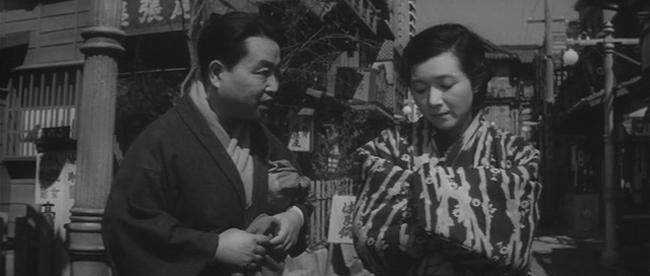
A principle difficulty faced by the aspiring artist or writer is the thorny issue of what constitutes legitimacy in a field where success and failure are attained in a seemingly endless variety of ways. Any course seems to be expensive and have at best a 10% chance of paying off. Add to that the normal difficulties faced by a woman in early to mid 20th century Japan and you can see why the story of author and poet Fumiko Hayashi is so remarkable. Her autobiography was adapted by Mikio Naruse in 1962, a good film called A Wanderer's Notebook (放浪記), with an extraordinary performance from Hideko Takamine as Hayashi.

The first scene of the film is a keen thesis statement for the rest--as a child, Hayashi accompanies her mother (Kinuyo Tanaka) to the police station where her father is being questioned. A street musician, he's accused of panhandling. The cops demand that he sing to prove he's really a musician but the man's so nervous he can't sing well. They conclude he was only pulling a scam--he's fined. The incident reminded me of the story from Alfred Hitchcock's childhood where his father sent him to a police station to be locked in a cell for being "naughty." Much as that incident seems to have inspired Hitchcock to make film after film about people wrongly accused of crimes, the incident from Hayashi's youth makes her keenly aware of the precariousness of an artistic career throughout her life.

In one sense, it makes her a fighter, constantly writing and submitting work to publishers, and in another sense, it gives her crippling low self-esteem. When the cops mistake her for a prostitute and thief later in the film, despite a friend's insistence that she's a writer, she puts up only a half-hearted defence and allows them to take her to the station without complaint.

She takes jobs in factories and bars to support herself and her lovers. She tries to get a job as a secretary but immediately leaves when it's clear her prospective boss expects her to have sex with him for the job. Working as a bar hostess, which in Japan entailed fawning over and chatting with men, she can play along but is less willing to put up with bullshit. In one extraordinary scene she fires off a rapid series of insults at a group of unruly drunks.

It works all the better because of Takamine's performance. I've seen her in a lot of movies but never like this. I suppose it's because she's affecting some of the real Hayashi's dialect and mannerisms--she's a little hunched and has a rolling gait, almost a swagger. She comes off as a tough dame which makes her moments of vulnerability all the more effective--and Takamine seems aware that she needs only subtle changes to achieve a great effect. In one of my favourite scenes, she comes home to find her lover with his mistress who claims to be his wife. She sits down as though nothing's odd and casually explains that she's his wife too--a slightly trembling lip and a few furtive looks are the small, devastating indications of what's happening under her tough exterior.

When her book is published late in the film, people comment on the number of men in her life. As she explains to her mother, she hates men but also can't help loving them. Her roommate early on, played by Daisuke Kato, is a widower who falls head over heels for her and is eager to lend her money whenever she asks. But when she tells him she's not attracted to him, he's disappointed but never pressures her--not for the rest of their lives. His presence in a late scene makes her unwillingness to give money to a writer's charity--"You have to work, it's the only way"--a little more complicated. But Kato's character is an exception among the other men in her life who often seem great at first but end up either casting her aside or abusing her.

Naruse adapted several of Hayashi's books to film so it's natural he would eventually adapt her autobiography. It doesn't have some of the bigger emotional moments and scope of the much better regarded Ukigumo (also starring Takamine) but A Wanderer's Notebook is pretty good.

No comments:
Post a Comment